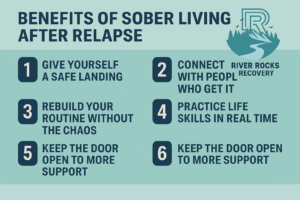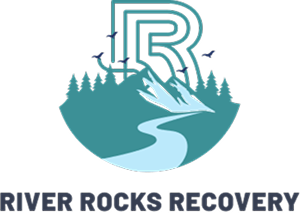Even when you have every intention to stay sober, life outside treatment can feel unpredictable. One small decision, one bad day, or one familiar trigger can send you back to old patterns before you even realize it’s happening.
If you’ve stepped away from a program—or ghosted it entirely—you might feel a mix of guilt, awkwardness, and fear about what comes next. You might even be wondering if you’ve already blown your chance. At River Rocks Recovery’s sober living program in Ohio, we’ve seen enough people return after setbacks to know this truth: relapse doesn’t close the door on recovery. Sometimes, it simply points you toward the support you actually needed in the first place.
For many, that missing piece is sober living—a supportive, structured environment that bridges the gap between treatment and full independence.
1. Give Yourself a Safe Landing
Relapse can leave you feeling like the floor has fallen out from under you. Sober living homes act as a landing pad—not a punishment. These homes are intentionally drug- and alcohol-free, so you’re not fighting temptation the moment you walk in the door.
When someone comes into sober living after a relapse, they often describe a sense of physical relief. They don’t have to keep scanning the room for triggers or making excuses to leave risky situations. The home itself becomes a protective barrier while they focus on healing.
Think of it as setting your recovery down on stable ground, so you can stand up again without feeling like the earth is shaking beneath you.
2. Rebuild Your Routine Without the Chaos
One of the hardest parts of recovery is managing unstructured time. After treatment, you may find yourself waking up late, skipping meals, or going days without social contact. That lack of rhythm can make it much easier to drift back into using.
Sober living creates a predictable flow to your day—wake-up times, group check-ins, shared meals, and quiet hours. It’s not the same as the highly regimented schedule of residential treatment, but it’s also not the total free-for-all of being on your own.
You can start reintroducing real-world responsibilities, like going to work or school, while still having built-in support. It’s the middle ground where you can practice new habits without feeling thrown into the deep end.
3. Connect With People Who Get It
Relapse can be incredibly isolating. You might avoid friends from recovery because you feel embarrassed, and the people you used to use with might not support your decision to stop again. That leaves you in a social no-man’s-land.
In sober living, you’re surrounded by people who understand both the struggle of staying sober and the reality of slipping up. Conversations aren’t about judgment—they’re about figuring out what works, what doesn’t, and how to keep going.
One client once told us, “The talks we had at the kitchen table were just as important as any therapy session I’ve ever been in. Everyone had been where I was.” That kind of connection can remind you that you’re not an outlier—you’re just a person still in the process.

4. Practice Life Skills in Real Time
Recovery isn’t just about staying sober; it’s about building a life that works without substances. That means learning (or relearning) how to manage money, keep up with chores, get to appointments, and maintain relationships.
In sober living, you get the chance to practice these skills in a low-risk environment. If you forget to pay your part of the rent on time, there’s a house manager there to help you problem-solve before it becomes a crisis. If you’re struggling to keep up with work and meetings, you can get advice from others who’ve been in the same position.
It’s a dress rehearsal for the independent life you’re working toward.
5. Keep the Door Open to More Support
One of the myths about relapse is that your only options afterward are going back into full-time residential treatment or trying to quit on your own. Sober living offers a third path.
You can live in a structured, recovery-focused environment while also attending outpatient therapy, joining local support groups, or even returning to work or school. This flexibility means you’re not cut off from your life, but you’re also not trying to hold it all together without backup.
At River Rocks Recovery, many of our sober living residents also participate in our outpatient programs. This combination creates a strong web of accountability and support, especially during the early months after a setback.
6. See Relapse as a Detour, Not the End
It’s natural to see relapse as a personal failure. But in our work, we view it as feedback. It tells us that something in your recovery plan wasn’t meeting your needs—maybe it was lack of structure, maybe it was loneliness, maybe it was stress you didn’t know how to handle.
Sober living addresses many of those underlying gaps by providing connection, accountability, and daily structure. Instead of starting over from scratch, you can pick up where you left off, this time with extra safeguards in place.
Relapse isn’t the end of the road; it’s a signpost pointing toward what you might need next.
7. Why Middletown, Ohio Is an Ideal Place for Sober Living
Your environment plays a huge role in recovery. Middletown offers a unique mix of small-town familiarity and community connection that can be grounding during a vulnerable time.
Many residents describe the slower pace as a relief after the constant buzz of larger cities. Whether it’s a morning walk past the Great Miami River or grabbing coffee from a local shop downtown, there’s a sense of place here that makes it easier to focus on healing.
Our sober living homes are close enough to local resources—grocery stores, public transit, community centers—without being right in the middle of high-risk environments. That balance allows for gradual reintegration into everyday life without being overwhelmed by it.
FAQs About Sober Living in Middletown, Ohio
Is sober living the same as treatment?
Not exactly. Sober living is a supportive housing option, not a clinical program. However, many residents pair it with outpatient therapy or other recovery services.
Do I have to be completely sober to move in?
Yes. Sober living homes require you to be free of drugs and alcohol at move-in. If you need detox before entering, we can connect you with resources.
How long should I stay in sober living?
It varies. Some people stay for a few months; others find a year gives them the strongest foundation. Your length of stay depends on your goals and comfort level with independence.
What’s a typical day like?
Expect a mix of personal time, house responsibilities, and optional group activities. You’ll have rules around curfews, guests, and chores, but you’ll also have flexibility to work, attend school, or engage in community events.
Is sober living in Middletown affordable?
Costs vary depending on the home and services offered. We can discuss options during your intake to help you find something within your budget.
If you’ve stepped away from treatment or had a setback, there’s still a path forward. You don’t have to walk it alone. Call (888) 905-6281 to learn more about our sober living services in Middletown, Ohio.

